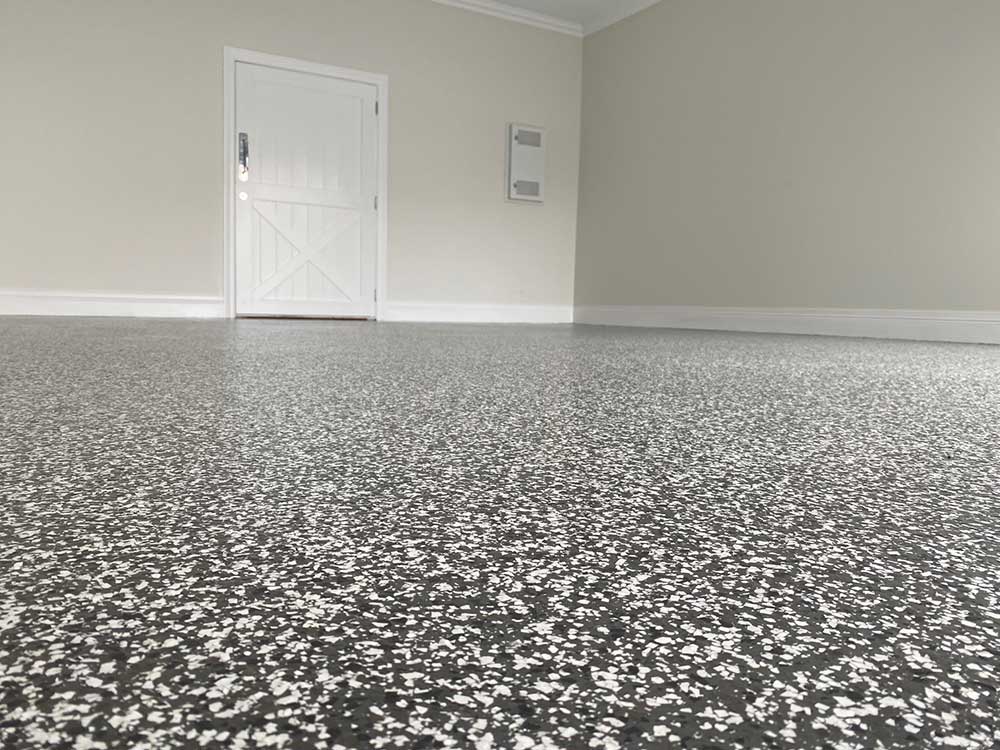The three P’s of epoxy coatings for concrete floors

For durability, toughness, safety and enduring good looks in all kinds of conditions, you can’t beat epoxy flooring.
Here at Tough Floors, we’ve built a rock-solid reputation for providing top quality epoxy floors across Brisbane, Sunshine Coast and the Gold Coast. We know there’s a lot of information available online regarding DIY epoxy coatings for concrete floors, and you may be feeling tempted to go down this route. You likely also have questions about how, and whether, to do this yourself. Questions like:
- What sort of preparation does my concrete need before I apply epoxy?
- What kind of epoxy should I use on my concrete floor?
- How do I apply epoxy to my concrete floor?
- What is the total cost to me versus having a professional complete the job?
Epoxy coatings for concrete floors are a great choice, but not an easy one to DIY. It isn’t a quick or a simple process, and there are three factors critical for success.
1. Preparation
We cannot stress this enough – preparation is key to having a long lasting epoxy floor.
Successful epoxy coatings for concrete floors hinges largely on how careful and thorough the preparation process has been carried out. Prepping the concrete for the coating is challenging, labour intensive, repetitive and time consuming. Any stains on the concrete will need to be scrubbed out and all traces of dirt removed. If your concrete isn’t flat or level (yes these are two different terms with two different meanings), this will affect the finish, as epoxy will adversely highlight the variation in your floor if not primed accordingly. Very few concrete slabs are flat or level.
Some DIY guides will advise repeat washing of the concrete with an acid/water solution (called “acid etching”) followed by more repeat scrubbings, to get the right level of grittiness to hold the epoxy. We consider acid etching to be the easy option, but also one that isn’t as effective (or as environmentally friendly, given it has to be washed off after) as the alternatives, which include mechanical diamond grinding and shot blasting.
When preparing a concrete floor for our customers, we use a range of diamond grinders and tooling to mechanically remove the top crust (laitance) and provide the surface profile required for the epoxy application. If needed, we’ll degrease the floor as well, to ensure that the epoxy can effectively penetrate into the concrete.
2. Product
Using the right epoxy coating is the next critical factor. Cheaper and less quality is not better, and there are three main types of epoxy carrier agents – solvent based, water-based, and solids-based.
Solvent based epoxy has high VOC content (volatile organic compounds) so is flammable during application and will produce strong fumes. Because of this, solvent based epoxy ideally shouldn’t be used indoors, or in any area without a respirator. Using a solvent based epoxy can also result in a thinner coating, as the solvent evaporates as part of the setting process.
Water-based epoxy, like the name suggests, uses water as the carrier, which is thinner and slows down the hardening process to allow time to apply and spread the coating evenly. It doesn’t produce fumes. However, it typically produces weaker results when substandard products are used.
Solids-based epoxy contains neither solvents or water, and has no fumes. While this may seem like a much easier option, the significant drawback is that once mixed, it must be applied and spread within an extremely limited time. This makes it challenging for home DIY application. The product’s TDS (technical data sheet) will give you the percentage of solids, and an indication of how long the pot life (working time) is.
Choosing the right product will depend on:
- Whether the coating will be applied to an interior or exterior surface
- The age and condition of your concrete
- Your location, weather and humidity conditions
Having a professional assess these factors can prevent an epoxy floor coating from failing that leaves you with an uneven, unattractive mess with no warranty or recourse. When consulting and quoting, we analyse the area and all the factors and recommend the best product that will create the finish you’re looking for. Having your epoxy floor applied by us also means you can opt for a fancier finish, with a range of professionally pre-mixed and custom flake, metallic, garage and refined blends available to our customers.
3. Process (and patience!)
The coating process is one that requires careful, steady and skilled application. A rushed or uneven coating will result in a poor finish.
We allow around two days to complete a standard 36sqm double garage (weather, humidity and temperature dependant). While the epoxy will usually dry overnight, a further two days cure time is needed for the epoxy coating to set and harden before you can walk across it or put anything back in the room; and seven days before a vehicle or other heavier items can be driven and parked on it.
We’re here to help
Whether you’re looking at epoxy coatings for concrete floors for your home, retail, commercial or industrial premises, here at Tough Floors we’re industry leaders with extensive experience and technical know-how. Get in touch today to chat with our friendly expert team and discuss your project.




